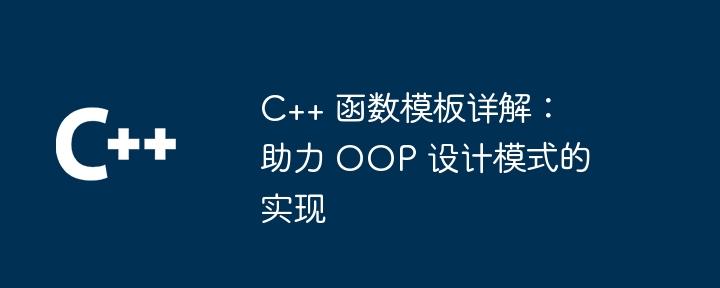
Function templates implement OOP design patterns in C, and their benefits include: Code reuse: Common code can be used for multiple data types, reducing duplicate code. Type safety: The compiler ensures that types are valid, improving reliability. Extensibility: Easily add new types by creating new instances.

Using function templates to implement OOP design patterns in C
Function templates are a powerful and flexible feature in C that allow We write generic code that works for different data types. Combined with object-oriented programming (OOP) principles, function templates can be used to simplify and enhance the implementation of design patterns.
Function template syntax
Function template uses angle brackets <> to specify template parameters:
template <typename T>
void foo(T x, T y) {
// ...
}Practical case: Strategy design pattern
The strategy pattern allows us to replace a certain behavior in a class with a different algorithm. Using function templates, we can write a generic function for selecting a policy:
template <typename Strategy>
void do_something(Strategy strategy) {
strategy();
}
struct ConcreteStrategyA {
void operator()() {
// ...
}
};
struct ConcreteStrategyB {
void operator()() {
// ...
}
};
int main() {
ConcreteStrategyA strategyA;
do_something(strategyA);
ConcreteStrategyB strategyB;
do_something(strategyB);
return 0;
}By using function templates, we can handle any new policy that matches a specific signature:
template <typename T>
void do_something(T& t, T strategy) {
// ...
}Function Benefits of Templates
Using function templates has many benefits when implementing OOP design patterns:
Conclusion
Function templates are powerful tools in C that facilitate clear and reusable implementations of OOP design patterns. By leveraging common code and the flexibility to handle undefined types, we are able to improve the quality and maintainability of our code.
The above is the detailed content of Detailed explanation of C++ function templates: assisting the implementation of OOP design patterns. For more information, please follow other related articles on the PHP Chinese website!
 What are the differences between c++ and c language
What are the differences between c++ and c language
 Recommended learning order for c++ and python
Recommended learning order for c++ and python
 Cost-effectiveness analysis of learning python and c++
Cost-effectiveness analysis of learning python and c++
 Is c language the same as c++?
Is c language the same as c++?
 Which is better to learn first, c language or c++?
Which is better to learn first, c language or c++?
 The difference and connection between c language and c++
The difference and connection between c language and c++
 C++ software Chinese change tutorial
C++ software Chinese change tutorial
 Cost-effectiveness analysis of learning python, java and c++
Cost-effectiveness analysis of learning python, java and c++




